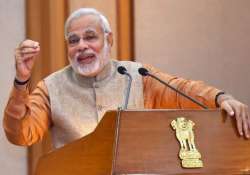Modi govt scores 7 on 10 for first year's performance: ASSOCHAM
New Delhi: Giving the Modi government 7 out of 10 for its first year's performance, industry body ASSOCHAM today said it still needs to cover some ground on tax issues and a lot more needs

New Delhi: Giving the Modi government 7 out of 10 for its first year's performance, industry body ASSOCHAM today said it still needs to cover some ground on tax issues and a lot more needs to be done on improving ease of doing business.
The country's macro-economic situation has improved in the past one year with decline in inflation, stability in currency and attractive financial markets, it said.
"However, the NDA government has to cover some ground in terms of taxation issues, particularly with regard to FIIs' problems on retrospective liabilities and in taking big-ticket infrastructure projects off the ground," ASSOCHAM said in a statement.
It also said a lot more needs to be done on improving ease of doing business at the state level.
"The industry and the commentators must realise that an economy of two trillion dollars, well integrated with the world, can't be catapulted into high growth, just with the change of the government. However much the government is sincere, policy tweaking, legislative changes and revival of INVESTMENT appetite need to be followed by increase in consumer demand, and would take time of say, 24-30 months. "And then, a lot would also depend on the global MARKETS which are subdued," ASSOCHAM said.
The government, it said, has made a good beginning, though it now needs to move faster on things like Goods and Services Tax and send a new signal of confidence.
"Seven out of ten, according to ASSOCHAM, is the right score for the Narendra Modi government on completion of first year in office," the chamber said.
ASSOCHAM President Rana Kapoor said government deserves credit for somehow making Parliament run better with the result that some of the difficult legislations have been cleared, including raising FDI limits in insurance and defence sectors to 49%.
"Likewise, investor confidence and transparency have been achieved with the successful completion of auction of coal blocks and spectrum, raking in over Rs 3 lakh crore for the Centre and states," Kapoor said.
However, the chamber said the focus must remain on further improving ease of doing business, as at the state level, a lot needs to be done.
Besides, the global environment for manufacturing is not conducive, as has been reflected in the downward trends in exports of merchandise goods.
Commenting on industrial output, it said that the growth in industrial production is not only a function of government policies but also a lot of domestic and global macro factors, which do not seem to be very friendly.
"Thus, the industry will have to be patient with seeing success in a considerable manner on the ground, since it would take some time before the corporates come out of the highly leveraged balance-sheets, and get support from the consumer demand, though some green shoots are visible in sectors like car sales," Kapoor said.
Industrial production grew at a five-month low of 2.1% in March even as both manufacturing activity and capital goods' offtake improved during the month.
According to ASSOCHAM, Prime Minister Narendra Modi's foreign visits have brought in qualitative change in the way our economic diplomacy is being pursued.
"The Prime Minister should continue to move forward in this regard since engaging with important powers like the US, Germany, along with China and other neighbouring countries at the summit level makes a lot of difference in India's perception," it said, adding that programmes like Make in India, Smart Cities and Swachch Bharat have been received well overseas.
Moreover, it said that even as the Jan Dhan Yojana has brought in Rs 14,000 crore in the banking system by 14 crore poor people, despite it being a zero balance scheme, the challenge lies in making these accounts active and not allow them to remain dormant.
The immediate challenge, it said, lies in dealing with the agrarian crisis with concerns of less than normal monsoon and the damage done by unseasonal rains in February-March.
The advantage of low inflation must be retained with better food management, it added.